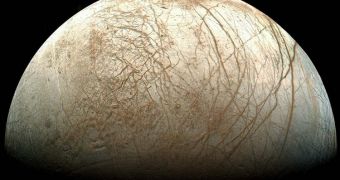Planetary sciences would stand to gain a lot from a potential mission to Europa, one of Jupiter's icy moons. An ocean of liquid water is believed to lie under a thick layer of solid ice, and sending a submarine to scout it out could reveal data about how life evolves, among others.
Investigator Steve Squyres, a scientist at the Cornell University, in Ithaca, New York, and also the lead scientist for the NASA Mars Exploration Rovers (MER), believes that this mission should be given a priority, due to the large amount of information we could gleam from it.
He explains that the floor of Europa's ocean may very well be capable of supporting various lifeforms. In fact, it is possible that life once existed on Europe, and that it now only survives deep underground. The exact same situation may apply on the Saturnine moon Enceladus.
Squyres explains that, although he would very much like to see a mission to Europa taking off as soon as possible, that is very unlikely to happen any time soon. “This is fantastic stuff. This is the holy grail of planetary exploration right here,” he said.
The announcement was made on March 21, during a speech Squyres gave at the Lunar and Planetary Science Conference, which was held in The Woodlands, Texas. The Cornell scientist believes that life can develop at any location, given enough water and energy.
These were the main two conditions required here on Earth, and they are, or were, met on Europa. In addition, studies conducted on deep-sea vent systems here on our planet revealed that these locations host vibrant ecosystems.
“You do the calculations for Europa, and what you find is that there ought to be hydrothermal activity; there ought to be volcanic activity at Europa's seafloor. This is a chance to search for a potentially habitable environment today on another world,” Squyres explained.
He was recently the chair of the US National Research Council's (NRC) Planetary Science Decadal Survey. The initiative was responsible for laying out planetary science objectives for the American scientific community, over the next decade.
“This is one of the hardest missions you can imagine. You need a power system that will enable you to get onto the surface. You then have to some way find your way down through what might be 10 kilometers of ice,” Squyres explains.
“And then you have to release some kind of free-swimming vehicle that is able to go down to the bottom of that ocean and find out what's down there,” he concludes, quoted by Space.

 14 DAY TRIAL //
14 DAY TRIAL //